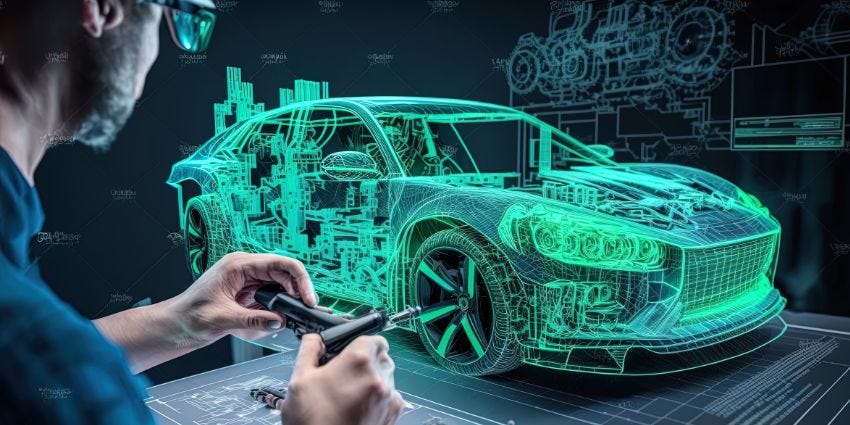
Automotive Engineering is a specialized field of engineering that focuses on the design, development, manufacturing, and maintenance of vehicles, particularly automobiles. It encompasses various disciplines such as mechanical engineering, electrical engineering, materials science, and computer science to create safe, efficient, and environmentally friendly vehicles.
Key Aspects:
- Vehicle Design and Development: Automotive engineers are involved in designing and developing vehicles from concept to production. This includes vehicle styling, aerodynamics, chassis design, powertrain design, and integration of various systems such as braking, suspension, and steering.
- Powertrain Systems: Automotive engineers design and optimize powertrain systems, including engines, transmissions, drivetrains, and exhaust systems. They focus on improving fuel efficiency, reducing emissions, and enhancing performance through technologies such as turbocharging, direct injection, and hybridization.
- Vehicle Dynamics: Understanding vehicle dynamics is crucial for automotive engineers to ensure stability, handling, and ride comfort. They study suspension systems, steering mechanisms, tire dynamics, and vehicle control systems to optimize vehicle dynamics and performance.
- Safety Systems: Automotive engineers design and integrate safety systems to protect occupants in the event of a crash. This includes passive safety features such as seat belts, airbags, and crash structures, as well as active safety systems such as anti-lock braking systems (ABS), electronic stability control (ESC), and collision avoidance systems.
- Electronics and Control Systems: Modern vehicles rely heavily on electronic systems and control algorithms for various functions such as engine management, emissions control, infotainment, and driver assistance systems. Automotive engineers develop embedded systems, sensors, actuators, and software to control vehicle functions and improve overall performance and efficiency.
- Materials and Manufacturing Processes: Automotive engineers work with advanced materials and manufacturing processes to improve vehicle performance, durability, and efficiency while reducing weight and cost. They study materials such as lightweight alloys, composites, and advanced steels, as well as manufacturing techniques such as stamping, welding, casting, and additive manufacturing.
- Environmental Considerations: Automotive engineers focus on developing environmentally friendly vehicles with reduced emissions and improved fuel efficiency. This involves researching alternative fuels, hybrid and electric vehicle technologies, and emission control systems to minimize the environmental impact of vehicles.
- Testing and Validation: Automotive engineers conduct rigorous testing and validation of vehicles and components to ensure compliance with regulatory standards and customer requirements. This includes durability testing, crash testing, emissions testing, and performance testing under various operating conditions.
Syllabus (Typically Followed in India):
- Engineering Mathematics:
- Calculus
- Differential Equations
- Linear Algebra
- Probability and Statistics
- Basic Sciences:
- Physics
- Chemistry
- Engineering Mechanics
- Thermodynamics
- Mechanical Engineering Fundamentals:
- Strength of Materials
- Theory of Machines
- Fluid Mechanics
- Heat Transfer
- Automotive Systems:
- Automotive Chassis Design
- Automotive Powertrains
- Vehicle Dynamics
- Automotive Electronics
- Automotive Materials and Manufacturing Processes:
- Automotive Materials
- Manufacturing Technology
- Automotive Body Engineering
- Automotive Production Processes
- Automotive Engine Systems:
- Internal Combustion Engines
- Engine Performance and Emissions
- Engine Design and Optimization
- Alternative Powertrains
- Vehicle Design and Development:
- Vehicle Design Principles
- Vehicle Aerodynamics
- Automotive Ergonomics
- Vehicle Prototyping and Testing
- Automotive Electronics and Control Systems:
- Automotive Electrical Systems
- Vehicle Diagnostics and Maintenance
- Engine Management Systems
- Vehicle Communication Systems
- Automotive Safety and Environmental Regulations:
- Automotive Safety Regulations
- Environmental Impact of Vehicles
- Emissions Control Technologies
- Vehicle Safety Systems
- Automotive Industry Practices and Management:
- Automotive Industry Overview
- Supply Chain Management
- Quality Control and Assurance
- Project Management in Automotive Engineering
- Project Work and Industrial Training:
- Students typically undertake a project in their final year, where they apply their knowledge and skills to solve a real-world problem or develop a vehicle component/system. They may also undergo industrial training or internships to gain practical experience in the automotive industry.
This syllabus provides students with a comprehensive understanding of automotive engineering principles, practices, and technologies, preparing them for careers in the automotive industry, including automotive design, manufacturing, research and development, testing, and quality assurance. It also lays the foundation for higher studies or research in specialized areas within automotive engineering.
